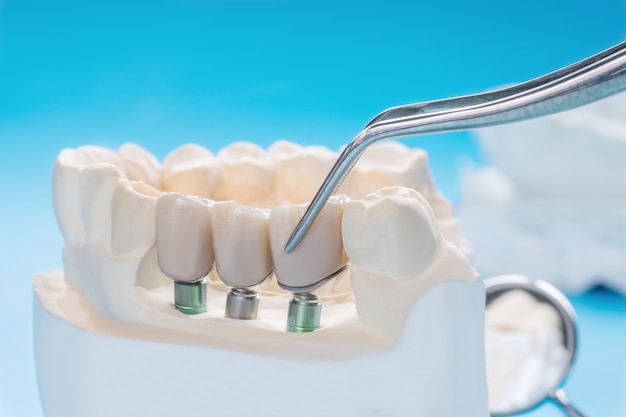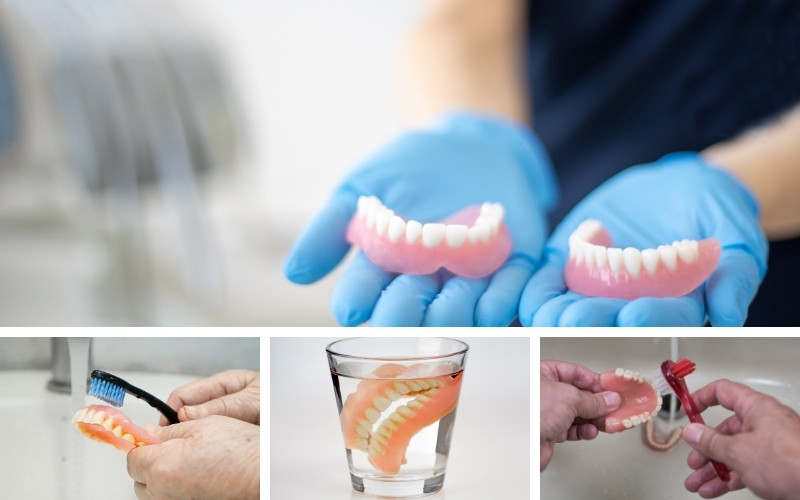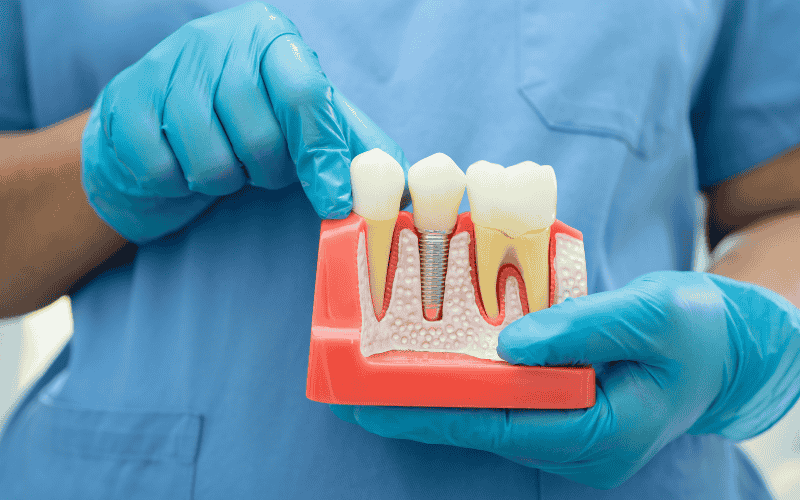
Dentures and implants are two alternatives when you need to replace one or more missing teeth. The best option for you will depend on many variables, including cost, personal preference, and the condition of your jawbone and remaining teeth. Dentures and implants have benefits and drawbacks, so it’s crucial to go through your alternatives with your dentist.
What Are Dentures?
Your dentist will create dentures, artificial teeth shaped to fit your mouth to replace missing teeth. Dentures can be complete or partial, covering the top or bottom gum line or simply the few missing teeth. Whatever type of dentures you require, your dentist will specifically make them for your mouth and will be visually similar to your natural teeth.
What Are Implants?
A dental implant can support one or more artificial teeth. It is inserted into the jawbone and functions identically to a tooth root. When a tooth’s root fails, it can be replaced by a titanium screw.
Are Dental Implants or Dentures Required?
When you have lost teeth, your confidence may suffer, but it isn’t the only reason you should consider getting dental implants or dentures. You may not know how much missing teeth might damage your health. It is easy for food and bacteria to become lodged in exposed gums. Additionally, if these food particles and germs aren’t eliminated, they could cause adverse conditions. Periodontitis, which has been connected to heart disease and diabetes, can occur due to these conditions. Missing teeth also influence how your jaw is built. It might lead to tooth shifting. This tooth displacement could trigger other problems. Your jawbone changes over time as your teeth move, making the structure of your mouth more unstable. The abovementioned factors can all result in tooth decay and additional tooth loss.
Procedure For Dentures VS Implants
Implants
Your dentist will remove your damaged root before creating a dental implant. After removing the root, he will drill a hole into your jawbone. Following this, your dental care professional will place a metal post that serves as a prosthetic root deep inside your bone. Once the bone has begun to form a ring around the post, anchoring it in place, the top of the post will be fitted with a crown. The post may need a few months to be prepared for an abutment, the component to which the crown will be attached. In some cases, the abutment is inserted simultaneously with the post. The next stage is to secure a crown on the abutment, an artificial tooth created to match nearby teeth.
Dentures
If dentures are required to replace all teeth, then your dentist will take an impression of either the upper or lower gums or both. He will examine your bite and the positioning of your upper and lower jaws before creating your dentures to ensure that the length will provide the best possible chewing and speaking. Then, a sample pair of dentures are made in a lab and delivered to your dentist. Before creating the final set of dentures, the dentures will be fitted to your mouth to see whether any changes to the teeth’s alignment or length are required. Dentures are fastened in place using a specific adhesive that is designed to mimic natural teeth and gums.
Dentures VS Implants: Cost
Dentures and other procedures, like bridges, are more expensive than dental implants. The American Dental Association (ADA) estimates that an implant may cost between $1,600 to $2,200 per tooth, while costs can vary depending on the dentist’s location and other considerations. The ADA estimates that the average price of a complete set of upper dentures is slightly over $1,600, and that of a complete set of lower dentures is almost the same.
Dentures VS Implants: Maintenance
A good oral care routine is essential for maintaining dental implants. This entails using a soft-bristle brush at least twice daily, flossing, and scheduling routine checkups. However, more consistent daily maintenance is necessary for dentures to last over time. For instance, you shouldn’t wear them to bed. During that period, they ought to soak in water or a unique cleaning solution. After eating, brush off your dentures to maintain regular oral hygiene.
Additionally, you might need to brush off any adhesive residue left on your gums. Dentures occasionally need to be re-fitted because your bite will fluctuate over time. On the other hand, dental implants are long-lasting implants that can need new crowns if the original ones crack or break.
Dentures VS Implants: Making A Decision
When you’re prepared to decide on your dental health, think about the following features:
Age
People in their 60s or younger may choose to consider dental implants because they are more durable solutions and can intend to use their prosthetic teeth for several decades. Older folks may prefer dentures, particularly those who don’t want to undergo the more time-consuming and painful implant procedures.
Bone Density
A specific amount of jawbone is needed for implants to support the posts. You may not be a good candidate for implants if you have lost bone tissue due to an injury, aging, gum disease, or tooth loss. To increase jawbone density, dental bone grafting can be used. However, the procedure is more expensive and time-consuming.
Function & Feel
Dentures may not offer the same level of comfort or effective chewing as dental implants.
Hygiene
Consider implants, which require less maintenance but are more expensive, if you’re unable or unlikely to make the time to care for your dentures properly.
Always consult with your dentist when you consider your alternatives. They can guide you toward the best choice and carefully describe the differences. Our dentists are happy to respond to any inquiries you may have and assist you in determining whether dental implants or dentures are the best options for you.


